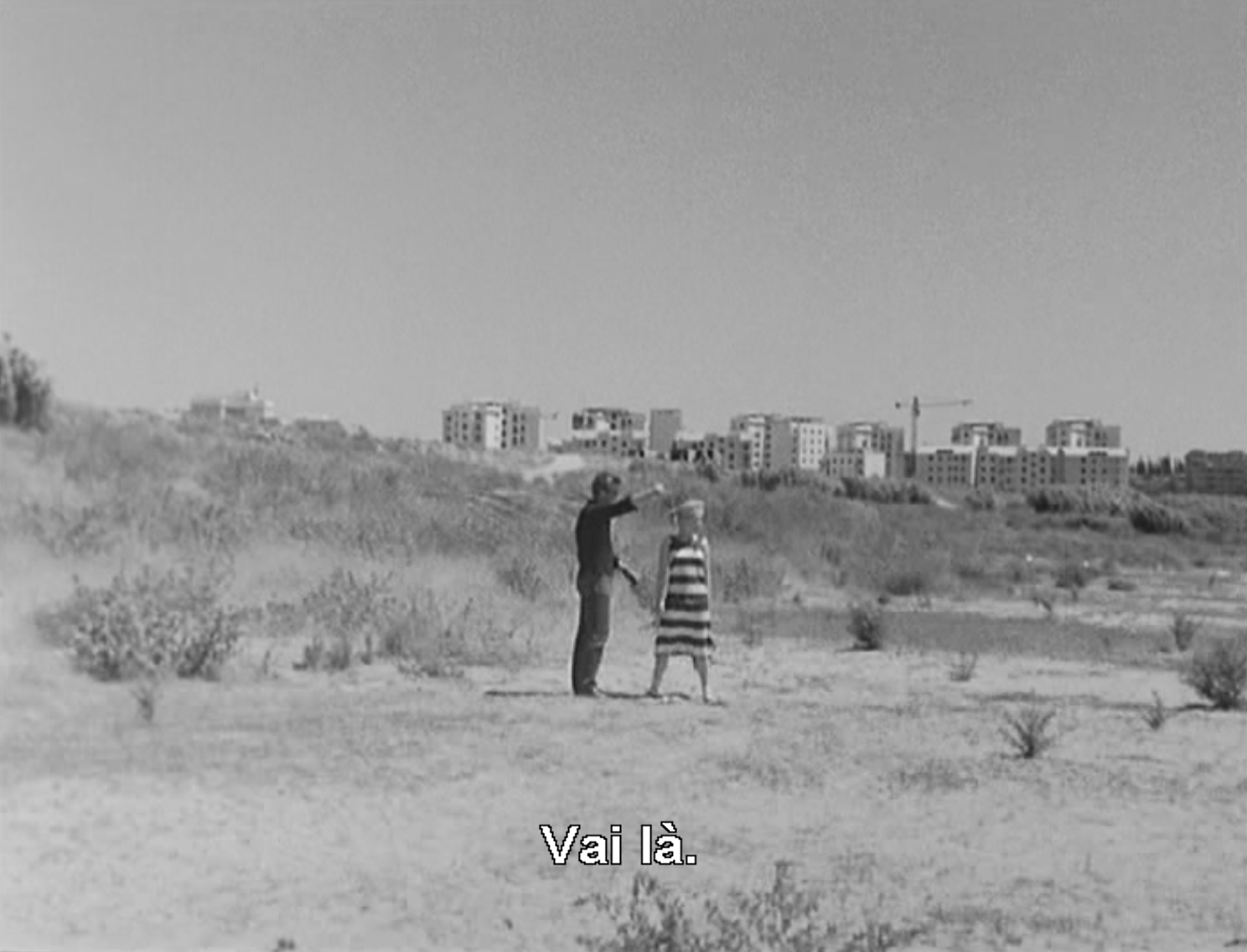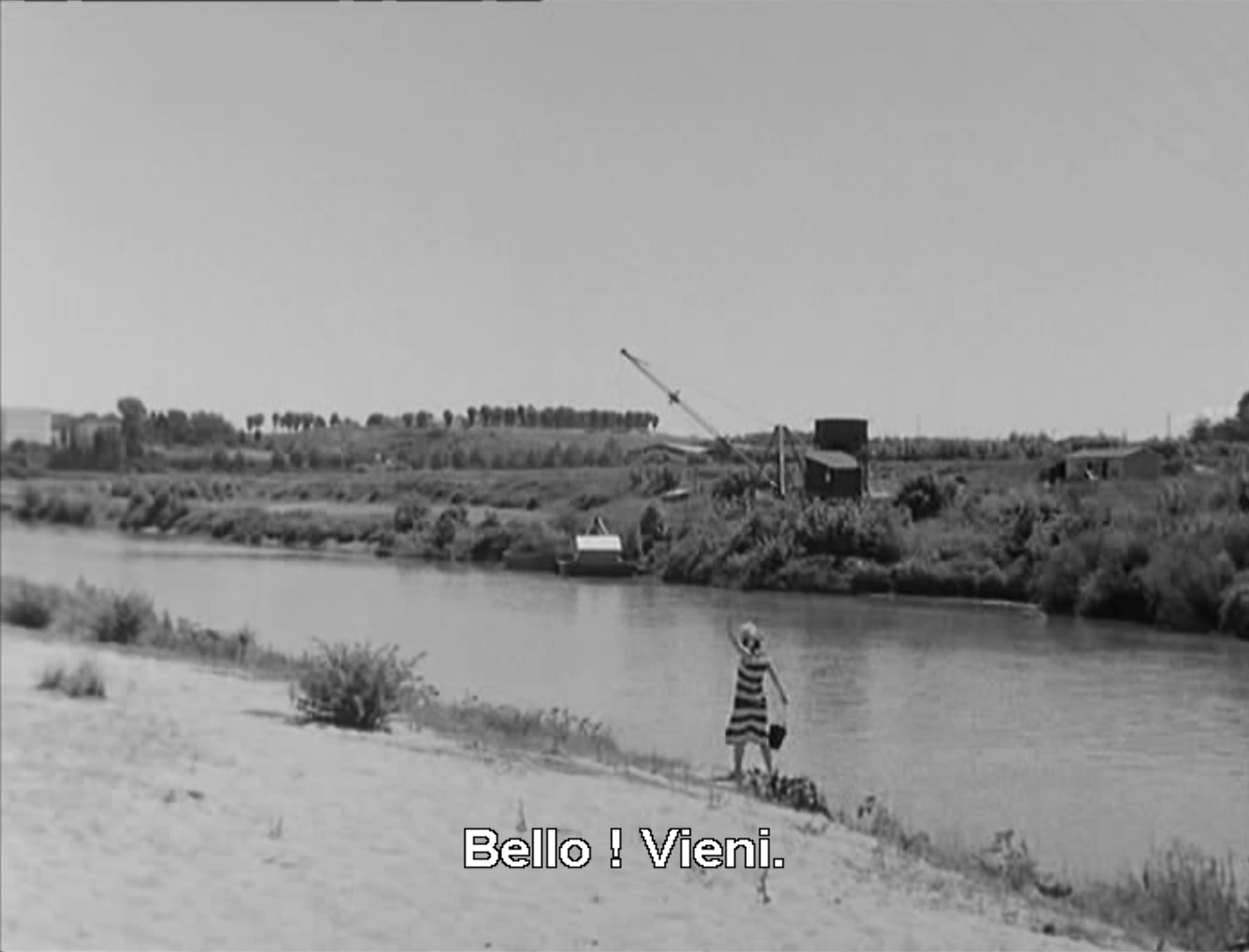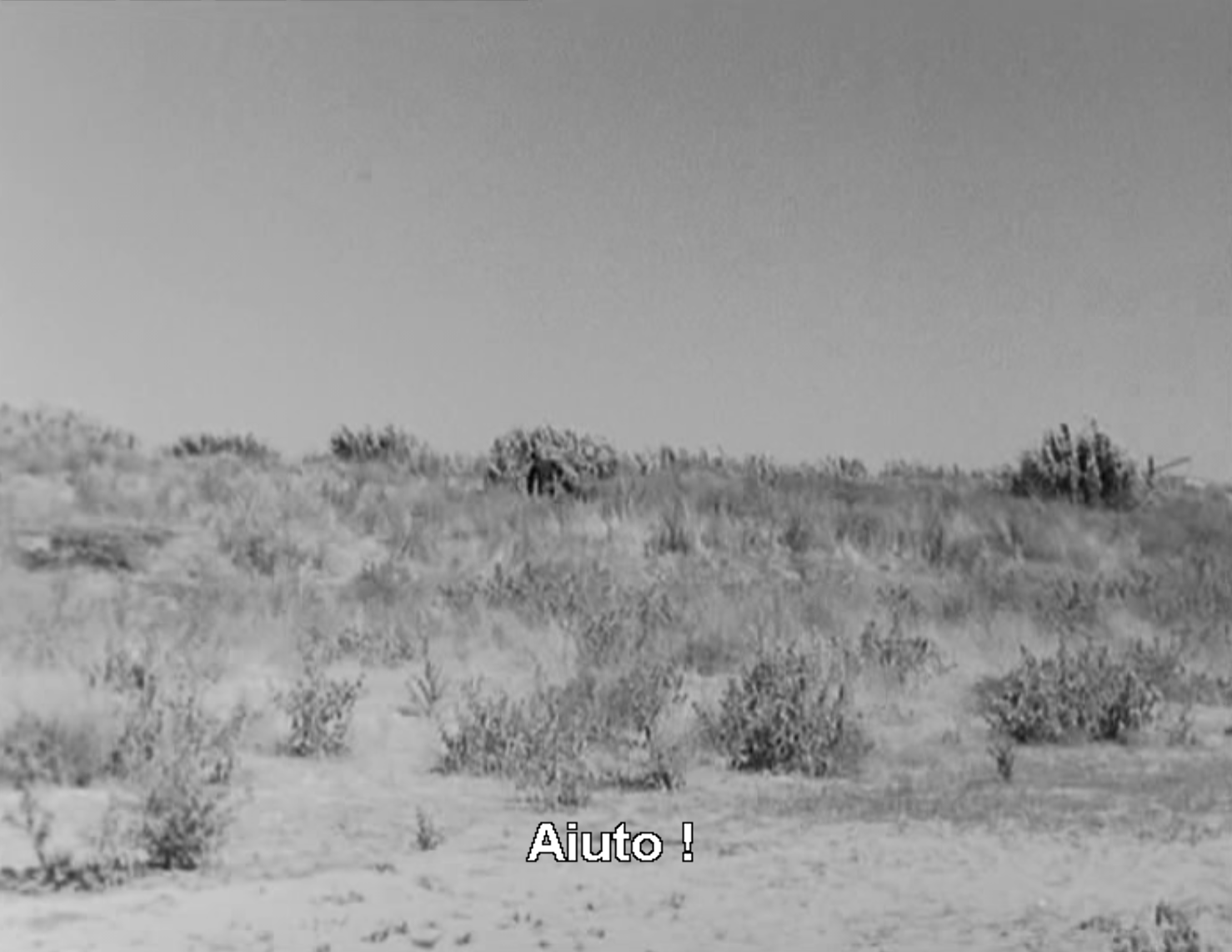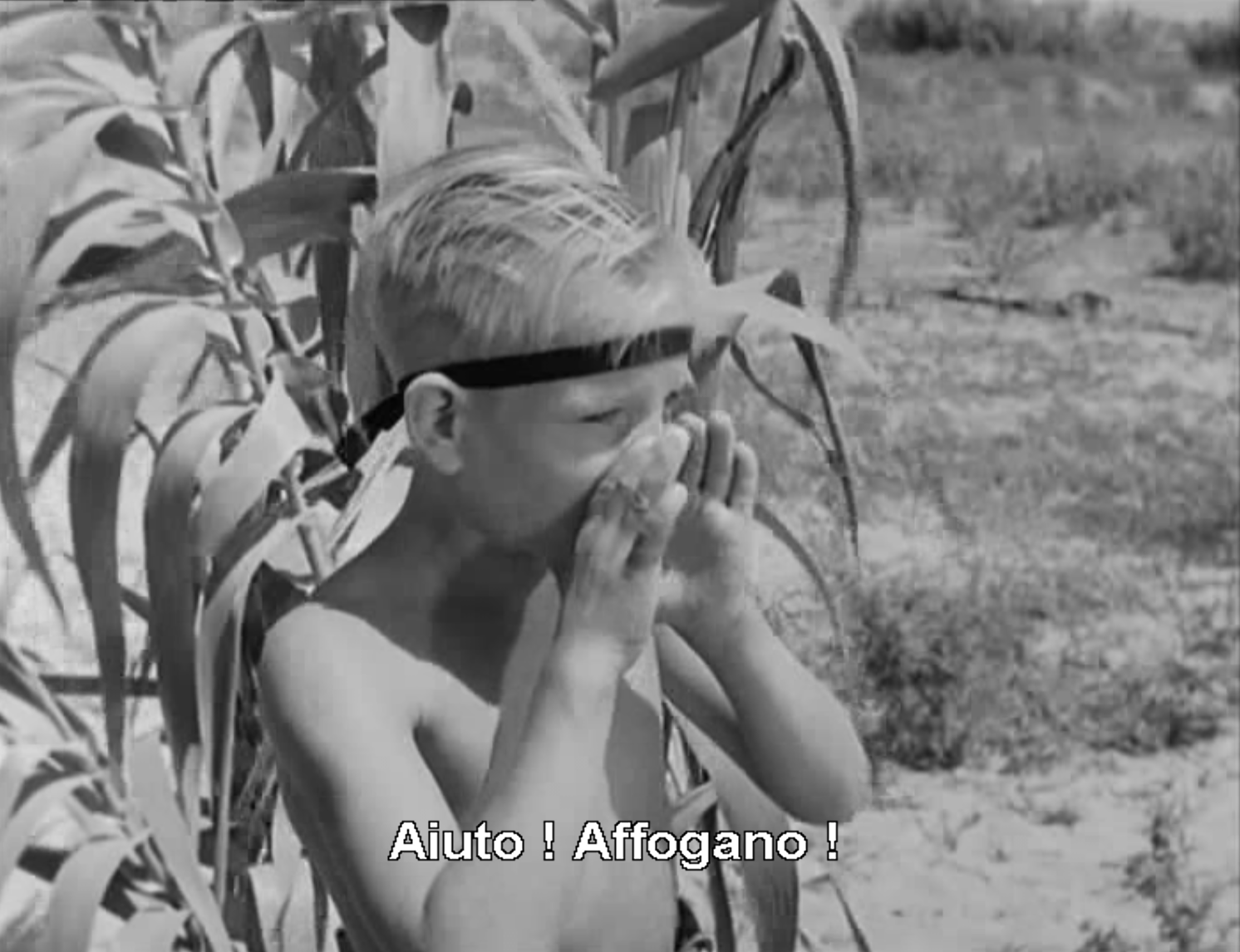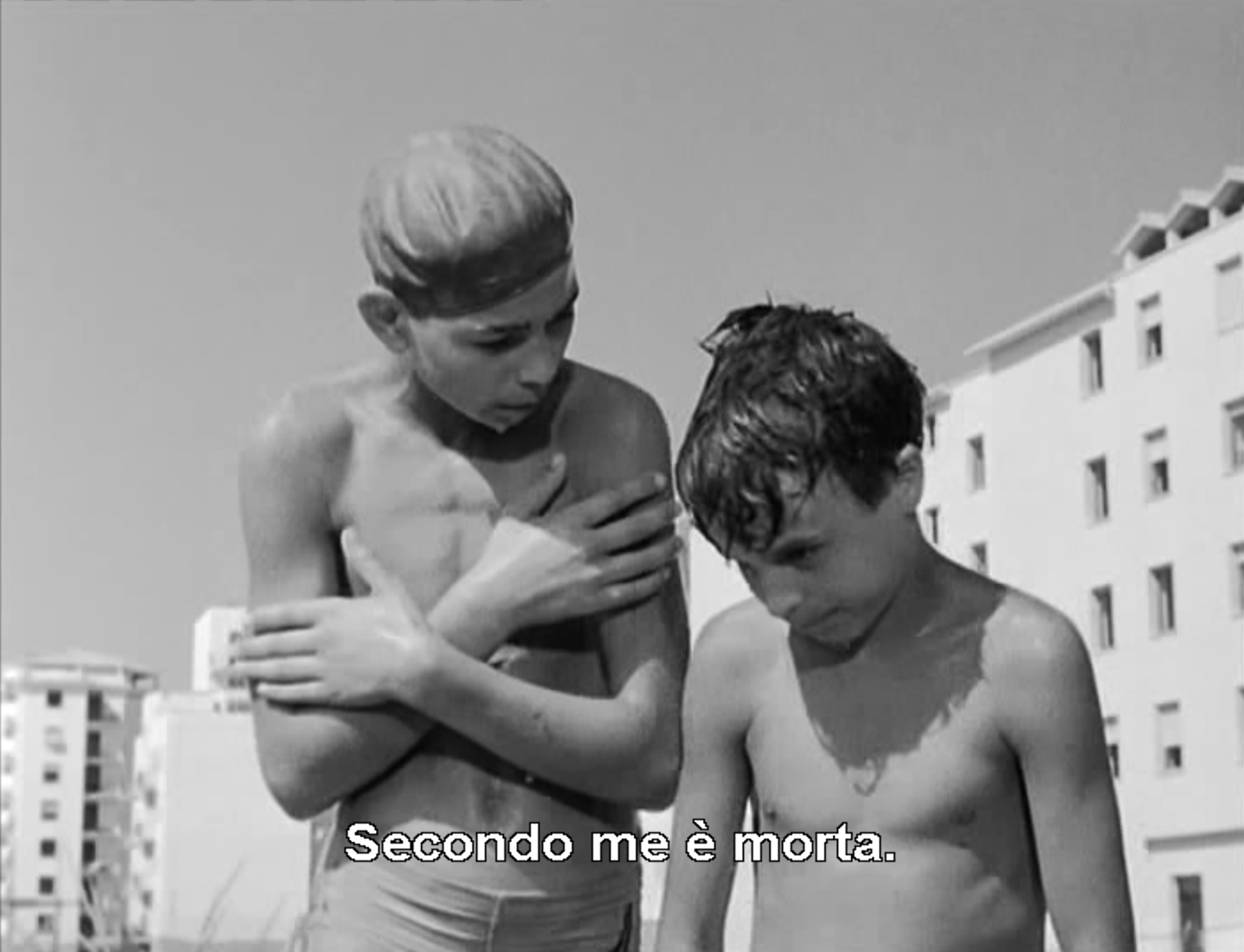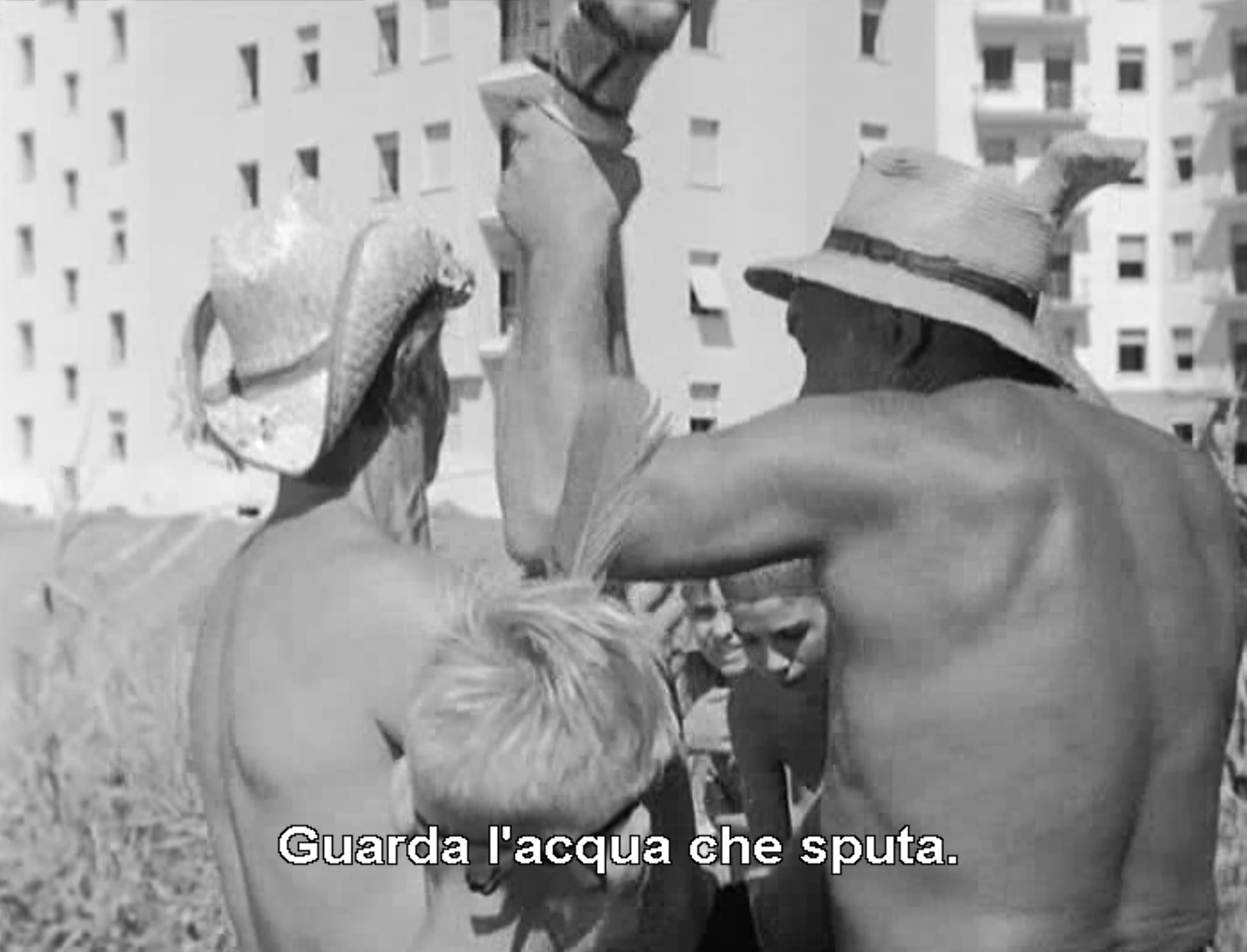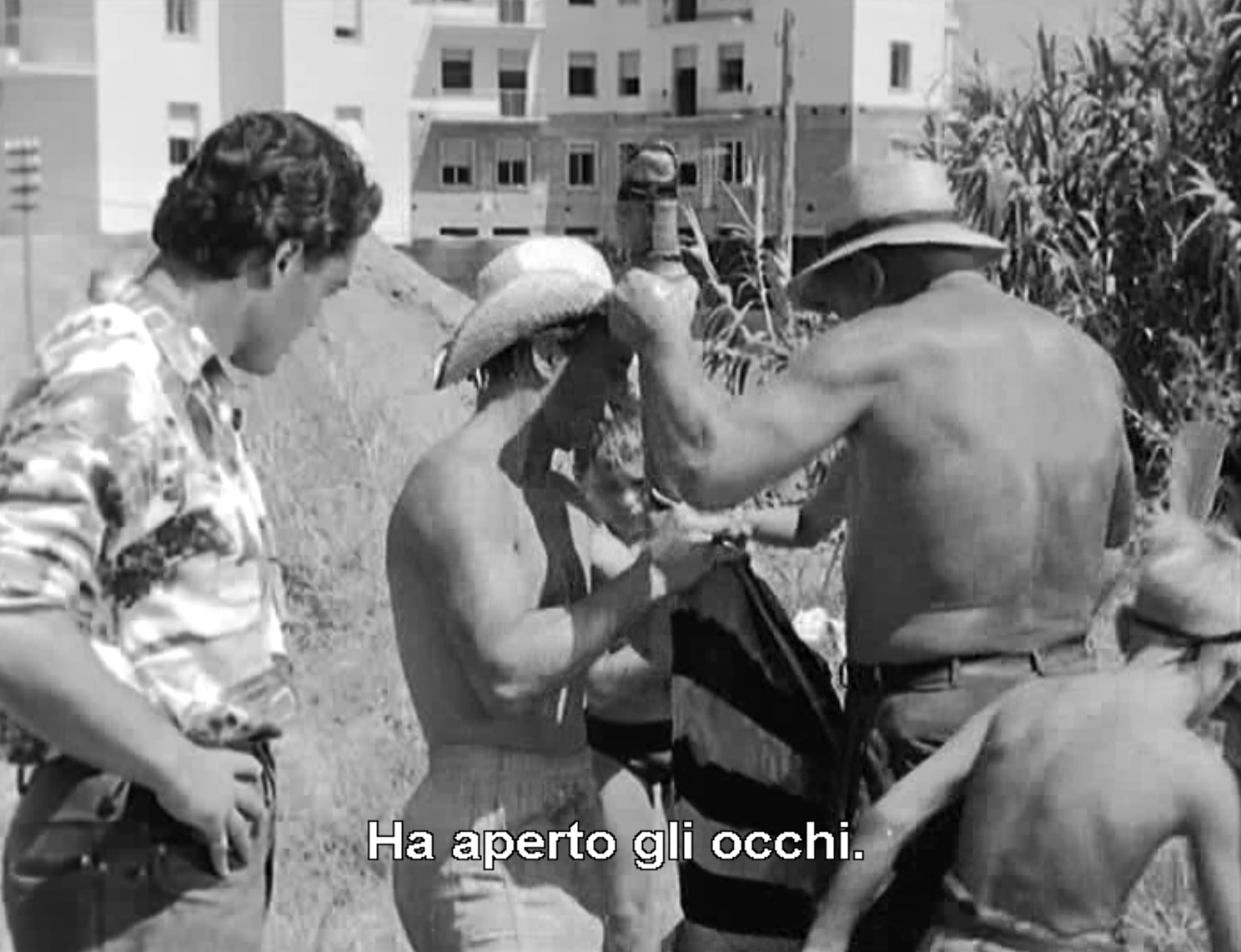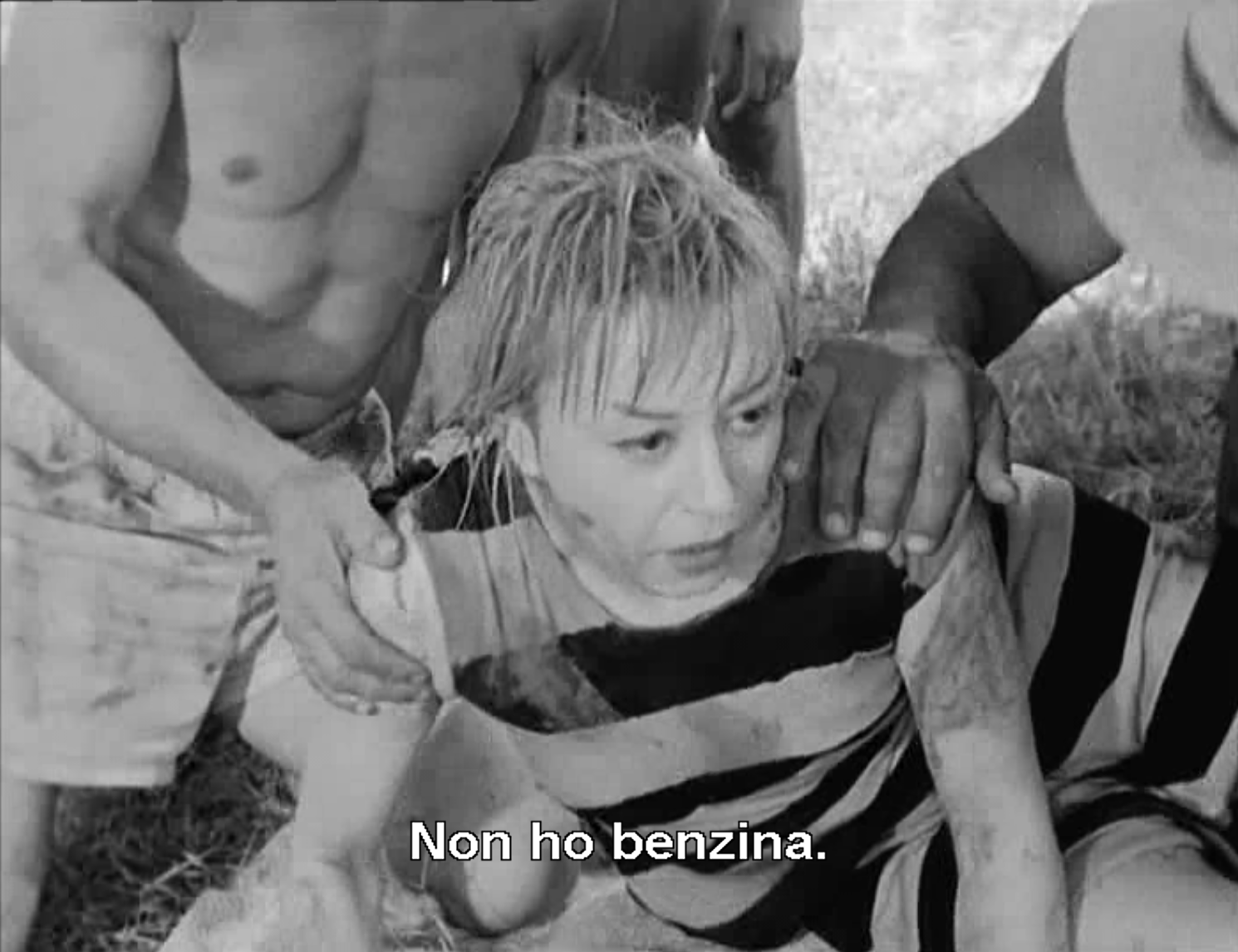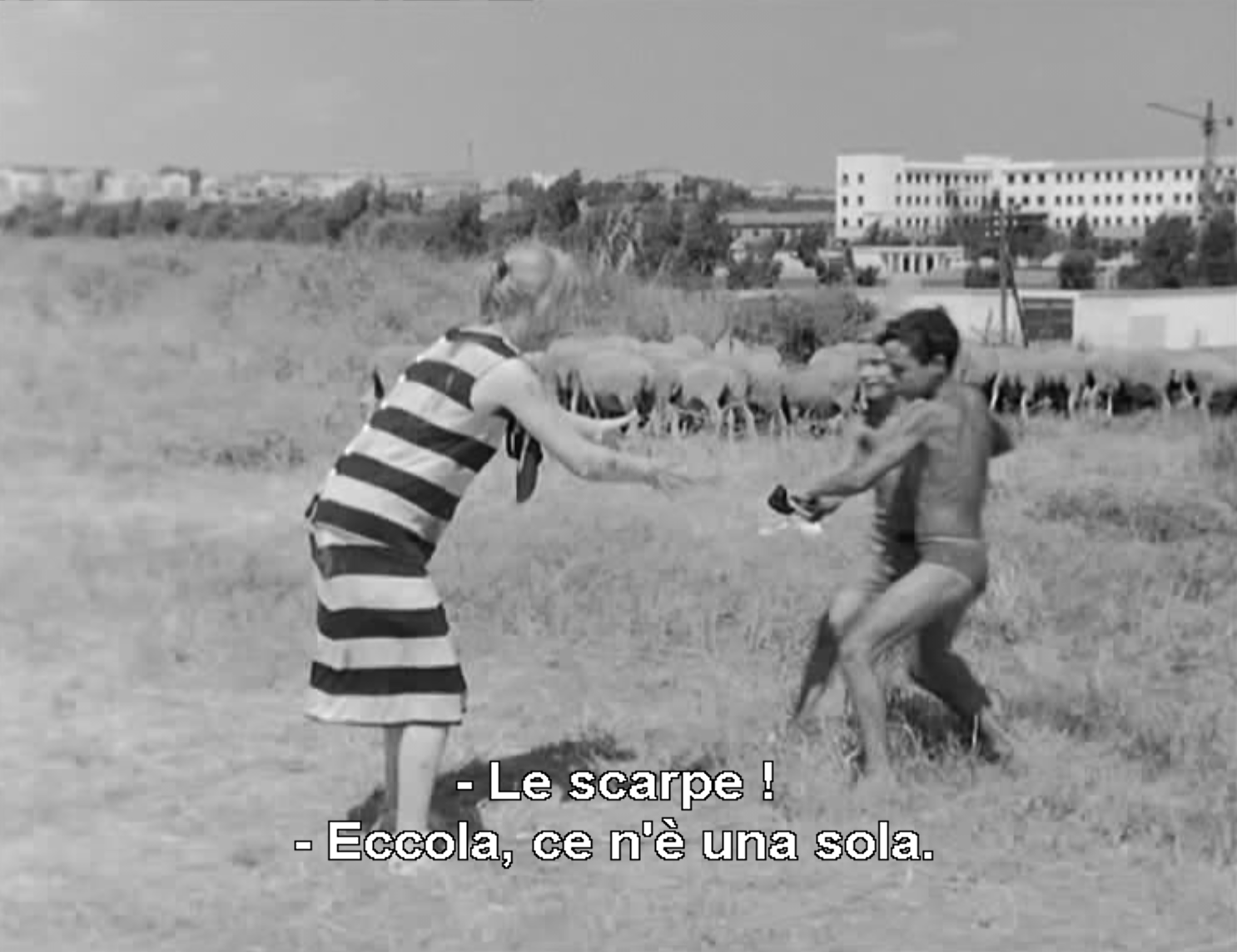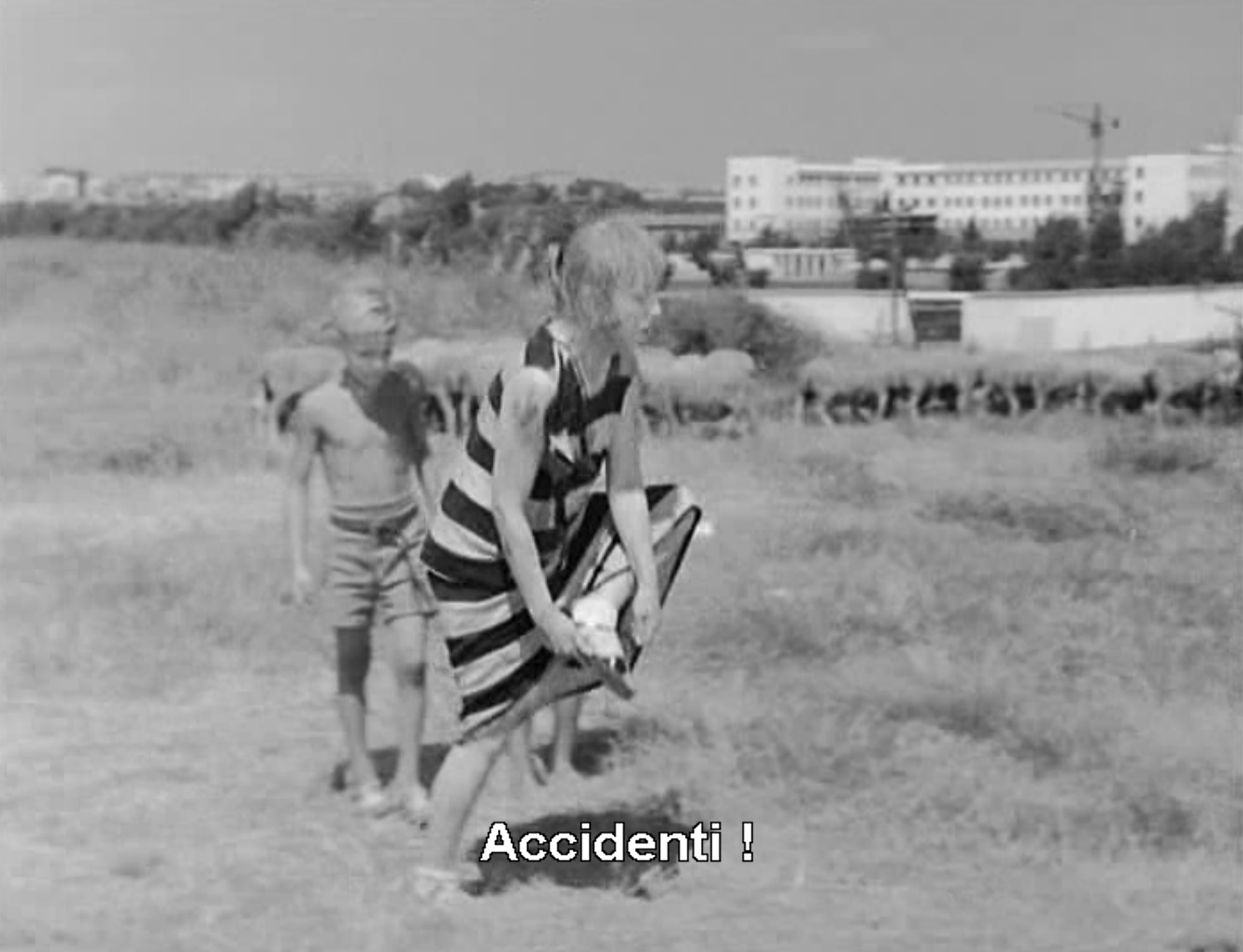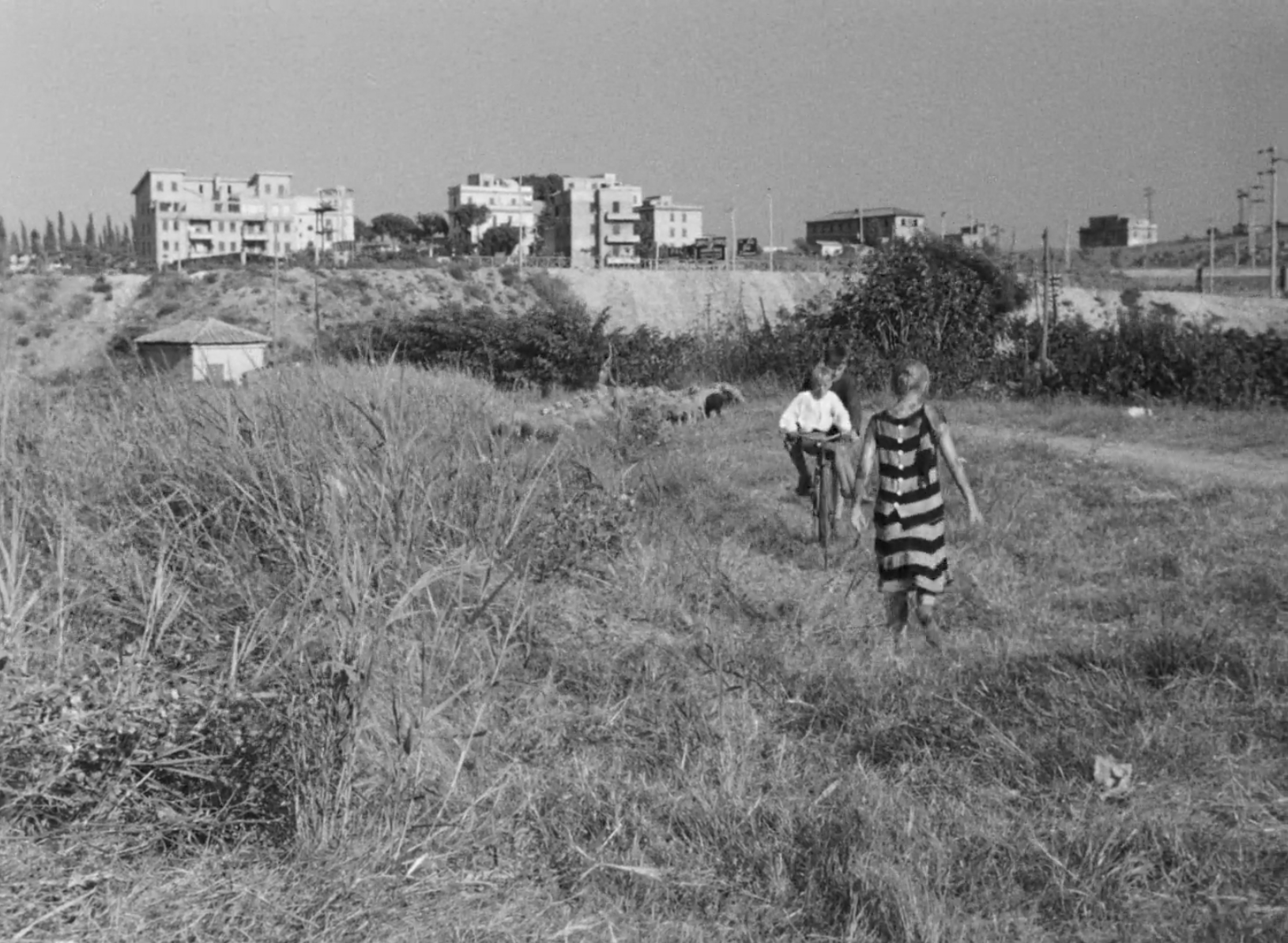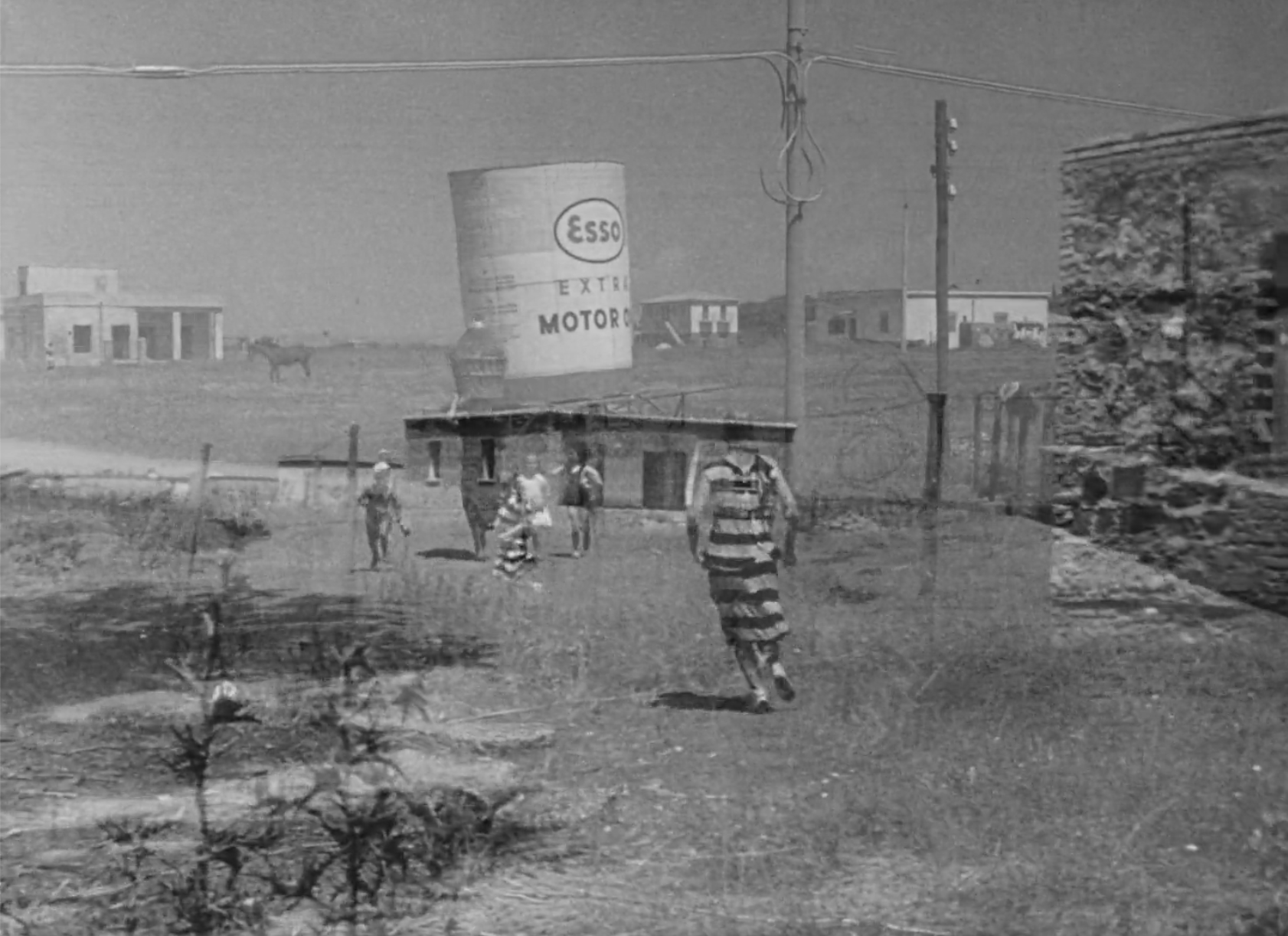Regia / Director: Federico Fellini, 1957
Sceneggiatura / Screenplay: Ennio Flaiano, Tullio Pinelli e Pier Paolo Pasolini
Fotografia / Cinematography: Otello Martelli e Aldo Tonti
Metà dello schermo è cielo e metà è boscaglia. La macchina da presa segue un uomo vestito di nero che corre dietro a una donna con un vestito a righe. Si abbracciano brevemente. Poi l'uomo indica: "Vai là!"
Sullo sfondo lontano, vediamo torri bianche di palazzi e una gru da costruzione; è il boom economico del dopoguerra in Italia.
Half the screen is sky and half is scrubland. The camera follows as a man dressed in black runs after a woman in a striped dress. They embrace briefly. Then the man points: “Go over there!”
In the far background, we see white towers of apartment buildings and a construction crane; it’s the post-war economic boom in Italy.
Cabiria (Giulietta Masina) corre alla riva del fiume. Gesticolando, esclama: "Bello! Vieni!" Lui le corre incontro, mentre lei agita la borsa come una bambina.
Cabiria runs to the waterside. Gesturing, she calls, “Beautiful! Come on!” He runs to her, as she swings her purse like a little girl.
Con gli occhi nascosti da occhiali scuri, lui (Franco Fabrizi) guarda a sinistra e a destra. Improvvisamente, afferra la borsa di Cabiria, la spinge in acqua e scappa.
Eyes hidden by dark glasses, he looks to the left and to the right. Abruptly, he grabs Cabiria’s purse, pushes her into the water and runs away.
Lei si agita nell'acqua: a quanto pare non sa nuotare. "Giorgio!" chiama, mentre lui corre via attraverso il campo. "Aiuto! Aiuto!"
She thrashes in the water: apparently she cannot swim. “Giorgio!” she calls, as he runs away across the field. “Help! Help!”
Un ragazzo biondo con una fascia nera e una piuma se ne accorge. "Aiuto!" chiama. "Affogano!"
A blond boy in a black headband and feather notices. “Help!” he calls. “Someone’s drowning!”
La gente comincia a radunarsi, urlando e discutendo su chi la salverà. Un uomo si toglie la giacca, poi se la rimette. Solo le braccia di Cabiria si estendono sopra l'acqua increspata.
People start to gather, yelling and arguing about who will save her. A man takes off his jacket, then puts it on again. Only Cabiria’s arms extend above the rippling water.
Infine, alcuni ragazzi si tuffano e nuotano verso di lei.
Finally, some boys dive in and swim to her.
Portano Cabiria, incosciente, a riva, dove due uomini con cappelli di paglia cercano disperatamente di salvarla.
They carry Cabiria, unconscious, to shore, where two men in straw hats try desperately to save her.
Guardando giù, un ragazzo dice: "Secondo me è morta". Dietro di lui, vediamo altre torri bianche con la loro griglia di finestre.
I ragazzi abbassano la testa addolorati.
Looking down, one boy says, “I think she’s dead.” Behind him, we see more white towers with their grid of windows.
The boys lower their heads in sorrow.
Gli uomini le pompano disperatamente le braccia, senza risposta. Alla fine la sollevano per le caviglie, con la testa che penzola, e la scuotono.
"Guarda l'acqua che sputa!"
The men desperately pump her arms, without response. Finally they pick her up by her ankles, head dangling, and shake her.
“Look how the water is rushing out!”
"Ha aperto gli occhi! Mettila giù!"
Cominciano di nuovo a pomparle le braccia.
“She opened her eyes! Put her down!”
They begin again to pump her arms.
"Si riprende! Tu, con la moto, vai a cercare un po’ di latte!"
"Non ho benzina!"
Cabiria si mette a sedere stordita.
"L’hai scampata bella" – dice uno degli uomini – "Puoi ringraziare il Padreterno".
“She’s coming to! You, with the motorbike, go get some milk!”
“I’m out of gas!”
Cabiria sits up in a daze.
“That was a close call,” one of the men says. “You can thank the Lord.”
Lei si guarda intorno. "Dov'è Giorgio?"
She looks around. “Where’s Giorgio?”
Si alza e corre attraverso il campo scalza, gridando con rabbia: "Giorgio!"
She gets up and runs through the field in her stocking feet, hollering angrily, “Giorgio!”
Con i capelli bagnati impiastrati sulla testa, guarda indietro in preda all'angoscia. Il piccolo gruppo di astanti la fissa con un misto di curiosità e preoccupazione.
With her wet hair plastered on her head, she looks back in distress. The small group of bystanders stares at her with a mixture of curiosity and concern.
Looking down, she exclaims, “My shoes!”
Two of the boys run up to her. “Here it is, there’s only one of them.”
“Dammit!”
Guardando giù, esclama: "Le scarpe!"
Due dei ragazzi corrono verso di lei. “Eccola, ce n’è una sola”.
“Accidenti!”
Poi crolla. Gli uomini la raccolgono; sembra di nuovo incosciente.
Then she collapses. The men pick her up; she seems unconscious again.
Lei si sveglia come una furia, lottando tra le braccia degli uomini, dando un calcio a uno dei ragazzi.
"Ehi!" – protesta lui – "Ti abbiamo salvata noi, sai?!"
She wakes in a fury, struggling in the mens’ arms, kicking one of the boys.
“Hey!” he protests. “We’re the ones who saved you, you know!”
"Ho capito, mi avete salvata!" dice sarcasticamente e si precipita via. Girandosi indietro, afferma la sua indipendenza: "E io voglio andare a casa, va bene?"
“Fine, you saved me!” she says sarcastically and rushes off. Turning back, she asserts her independence: “And I wanna go home, okay?”
"Ciao, Cabiria!" la saluta un ragazzo in bicicletta.
"La conosci?"
"Certo! Lei è Cabiria".
"Dove abita?"
"Ad Acilia, dopo il rifornimento di benzina. È una che fa la vita..."*
*Questo è un modo per dire che è una prostituta.
“Hi, Cabiria!” a boy on a bicycle greets her.
“You know her?”
“Sure! She’s Cabiria.”
“Where does she live?”
“In Acilia, near the gas station. She’s in the life…”*
*This is a way of saying that she’s a prostitute.
Cabiria cammina verso casa attraversando la periferia di Roma. In un'inquadratura elegantemente composta, le ombre degli alberi la raggiungono da sinistra, mentre un basso muro si estende sulla destra. Una donna che tiene in equilibrio una cesta sulla testa si avvicina, affiancata da dei bambini piccoli. Dietro di lei, un cavallo posa in un profilo perfetto.
Ciò che attira l'occhio in questa composizione non è Cabiria malandata però, ma una latta gigante che pubblicizza l'Extra Motor Oil della Esso, un furbo messaggio politico infilato in questo film sugli italiani che vivono ai margini del boom.
Cabiria strides home through the outskirts of Rome. In an elegantly composed shot, the shadows of trees reach out to her from the left, while a low wall stretches out on the right. A woman balancing a basket on her head approaches, flanked by small children. Behind her, a horse poses in perfect profile.
What draws the eye in this composition is not bedraggled Cabiria, though, but a giant can advertising Esso Extra Motor Oil, a sly political message tucked into this film about Italians living on the margins of the boom.
Una dissolvenza bella e inquietante – una delle tante in questo film – ci porta lungo il sentiero sterrato fino alla casa di Cabiria. Con una scarpa sola, corre verso la soglia. Sullo sfondo, dei bambini giocano su un'impalcatura spoglia.
A beautiful and haunting dissolve – one of many in this film – carries us down the dirt pathway to Cabiria’s house. With only one shoe on, she runs to the doorway. In the background, kids play on bare scaffolding.
Da un pezzo di terra pieno di erbacce, vediamo Cabiria che arriva alla sua casa, una struttura minuscola dal tetto piatto fatta di rozzi blocchi di cemento. Questa casa è una fonte di orgoglio per Cabiria; sarà un motivo della storia. Fili di perline sono appesi all'ingresso; ha una piccola pianta in vaso al lato della scala dell’ingresso.
From a weed-filled lot, we watch Cabiria arrive at her house, a tiny flat-roofed structure made of crude cinder blocks. This house is a source of pride for Cabiria; it will be a motif of the story. Strings of beads hang at the entrance; she has a small potted plant at the side of the stoop.
Bussa alla porta con forza, urlando per chiamare Giorgio, immaginando che lui sia dentro, che la stia aspettando. Chinandosi, sbircia dal buco della serratura.
She pounds on the door, calling for Giorgio, imagining that he is inside, that he is waiting for her. Stooping down, she peeks through the keyhole.
E poi si arrende. Scende le scale e si guarda intorno disperata.
È chiusa fuori dalla sua stessa casa, la chiave è nella sua borsa rubata. Giorgio, che l'ha spinta nel fiume, non ha nemmeno avuto la cortesia di tornare a casa e farla entrare.
And then she gives up. She walks down the steps and looks around in despair.
She’s locked out of her own house, the key in her stolen purse. Giorgio, who pushed her into the river, didn’t even have the courtesy to come back home and let her in.
FINE PARTE 1
Here is the link for Parte 2 of this cineracconto. Subscribe to receive a weekly email newsletter with links to all our new posts.
A note about the translation:
The dialogue in the cineracconto (photo-story) of NIGHTS OF CABIRIA, for the most part, reflects the actual spoken dialogue of the film. But, much of the dialogue is in Roman dialect; we’ve translated it to standard Italian, except where otherwise noted. Occasionally, we’ve changed a word or phrase to a more basic level, but for the most part, you’ll see the actual spoken battute (lines).
While our past, more advanced level cineracconti (up to THE SOUTHERNER, June 2021) included pretty much every scene and nearly all the dialogue verbatim from our films, our lower intermediate level cineracconti (starting with OSSESSIONE, September 2021) are shorter and recount a more abbreviated version of the film. (To see the more advanced cineracconti, please go to the blog Welcome page where the Italian movies are listed on top; Italian and international films are directly below, in chronological order.)
In writing our cineracconti, we aim for a fluid, standard Italian – though in places, it might seem more basic than how an average Italian would speak. Then we write an English translation – which is naturally also at an intermediate level of English. You will not see a literal – word-for-word – translation, but rather, a “literary” one: an accurate representation of how someone would actually say the line in standard American English.
Where subtitles offer good examples of intermediate-level Italian that can be useful to language learners, we’ve included them for fun!
We love language and we sometimes spend a very long time debating a particular word or phrase. We’d be very happy to hear your thoughts about our translations. Write to us at info@liconoscevobene.net!


